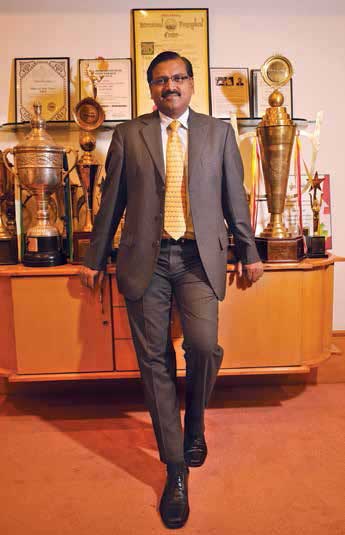
Prof. Dr Uday Salunkhe, Group Director, Welingkar Institute of Management Development & Research, Mumbai and Bengaluru (WeSchool) Prin. L. N. Welingkar Institute of Management Development & Research, or WeSchool as it is better known, is a crucible of innovation: Be it the innovative and ear-to-the ground approach to new course programs, tie-ups with industries, government and non-government bodies and global institute-to institute alliances, the initiatives have been forward-looking and path-breaking. At the helm of these initiatives is Group Director Prof. Dr Uday Salunkhe who believes in spearheading progress, hands-on
Prin. L. N. Welingkar Institute of Management Development & Research (WeSchool) features among one of the best business schools in India. The institute is run by a charitable trust, Shikshana Prasaraka Mandali, Pune, which has numerous educational institutions all across the state of Maharashtra. Established in 1977, WeSchool was first among management institutes to offer Post Graduate Diploma in Management (PGDM) in new areas such as Retail, Business Design & Innovation, Rural Management, Healthcare Management, and E-business. WeSchool has received an approval for Post Graduate Diploma programs in much needed areas like Media &Entertainment and Business Analytics this year. One of the notable achievements of the institute is the autonomous status that it got recently. With this autonomy, the institution gets enhanced agility for starting and structuring its programs designing course curricula as per industry requirements, make the training more ‘learner-centric’ and planning internships.
Expanding its wings, WeSchool, Bengaluru was established in 2008 at Electronic City Phase–1 where three full-time courses such as PGDM, PGDM – E-Biz and PGDM-Business Design & Innovation were introduced.
WeSchool has pioneered programs such as Business Design and Innovation, E-business, Retail, Healthcare, Rural Management, and initiated several partnerships with industry and international universities. In 2015, WeSchool received the ‘AICTE-CII Best industry-linked management institute’ award. It also received the ‘Best Institute of the Year’ award from the Associated Chambers of Commerce of India (ASSOCHAM) in 2016.
In the light of its achievements, Corporate Citizen caught up with the dynamic Group Director of the Institute, Prof. Dr Uday Salunkhe, who took us in and out through the institute, highlighting the achievements, various courses, alumni, and faculty while also throwing light on management education in today’s times and giving a vision for the institute.
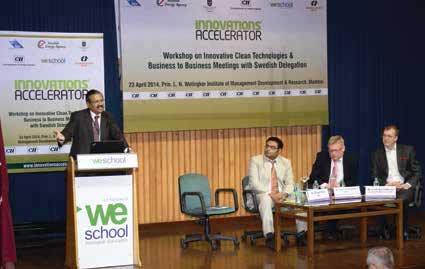
A lot of water has flown under the bridge since the point we started way back in 1977 in a small campus of around 7, 500 square feet in Sion, Mumbai. Today we stand as a brand—globally reputed, with two state-of-the art campuses in Mumbai and Bengaluru. In terms of programs too, the years have seen manifold growth.
We have matched our steps with the dynamics of the fast paced world of business, not only to configure programs that meet the talent requirements of the industry but also to make sure that we create future thought leaders who are well versed with the implications of their moves. Our programs are heavily oversubscribed. We have world leaders in their respective spaces heading the programs...and not to miss out, the strong industry connect. The industry is equally engaged in shaping the content and ensuring effective delivery of the same on the field training.
‘With this autonomy, the institution gets enhanced agility for structuring its programs, designing the course curricula as per industry requirements and planning internships. It strengthens our efforts to provide skill based education that will facilitate job creation by aligning training and skilling in sync with the industry needs’
We have programs in Design Thinking, Healthcare, E Biz, Entrepreneurship, Media, Business Analytics, Retail and lot more. We have held hands with the best of institutes across the world and our students have been holding positions at some of the best companies across the globe. It is a great feeling to see your initiatives and recommendations being implemented by policymakers and business owners to unknot some of the issues. Our alumni include business-owners with operations across continents and professionals in leading positions of VPs, strategists, and country heads at well-known corporate houses, home and abroad.
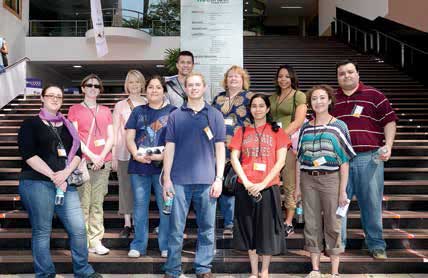
Established in 1977, under the aegis of the Shikshana Prasaraka Mandali, WeSchool is a well-ranked business school in the country. Initially, Welingkar offered programs like MMS, PGDM, and MHRDM. Around 1999- 2000, we felt the need to reinvent management education. Subsequently, responding to the needs of the times, we introduced programmes in E-Biz, Retail, Business Design and Family Managed Business. The decision was well considered and discussed not only with academics but also with industry stalwarts. Today we are an internationally reputed B-school. Our flagship PGDM programs offer full-time/part-time programs/university affiliated degrees, distance education programs, corporate training programs and has a full-fledged research centre.
In 2000, we relocated from the humble space of 7500 sq feet in Sion to the present 1, 10,000 sq feet state-of-the-art infrastructure in the heart of Matunga. A beautifully built vertical campus, it was designed after studying the portals of well reputed international business schools. Obviously, we were on a trajectory of growth and development, and there was no looking back. The Bengaluru campus happened in 2008. It is known for its strong student-academics-industry connect. In the process, we challenged conventions, collaborated with corporates, government and NGOs; designed innovative programs that answered the challenges of the times and created new paradigms in management education. WeSchool is the brand name of the institute. The rationale behind the name is We (versus I) that has immense promotpotential and power.
WeSchool enjoys a diversity of students with respect to their graduation and the sectors represented, among them, with work experience. Almost 55 percent of applicants who opt for We- School’s PGDM programs are from engineering/technology background, and almost 50 percent of them come with work experience. We also have applicants from Health/Medical /Para-medical, Legal/Hotel Management backgrounds, along with the ones coming from various streams of Humanities. Business own- ers and entrepreneurs are also part of the student community at WeSchool. WeSchool has a holistic selection process ensuring a very healthy male: female ratio among students. Balanced almost 50:50, WeSchool’s diversity quotient, be it gender, geography, graduation or work experience is what enriches its ecosystem.
Our flagship programs include the two year, full-time, MMS affiliated to the University of Mumbai and the AICTE approved PGDM (with Marketing/Finance/Operations/HR specialization), PGDM- Business Design, E-Biz, Retail, Rural Management (Emerging Economies) and Healthcare. Besides these, we have the PGP–Entrepreneurship Management, a very popular program among business owners for expansion and scaling up their operations. It has seen business owners successfully applying the classroom learning to their businesses.
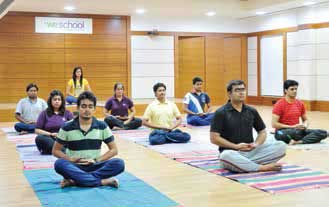
Yes. Welingkar’s hybrid programs are quite well-regarded. They are a well-deliberated blend of technology and live interactions which provide a holistic experience to the students, with appropriate study material in the shape of books and CDs. Parallely, it arranges for virtual classroom lectures, industry visits, video library and placement support. Apart from this, experiential learning workshops are conducted and technology is used to the extent possible, to remain in constant touch with the students of WeSchool. It has been one of the top-ranked distance learning programs for years, going by the rankings by different publications. It has all the flexibility of distance learning, integrated with well-planned modules of team activities wherein the students engage in outbound activities learning self -knowledge, tenacity, team dynamics, stress management and creativity leadership via experiential learning.
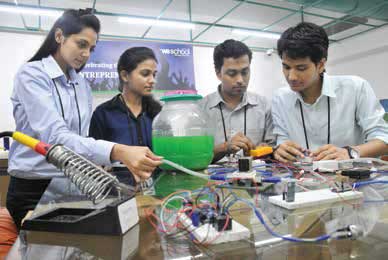
It is a moment of pride, and may be a step towards being a private university. With this autonomy, the institution gets enhanced agility for structuring its programs, designing the course curricula as per industry requirements and planning internships. The status comes after a thorough audit and review by State as well as UGC appointed committees. The University of Mumbai grants autonomy based on the parameters of excellence in academic performances, capability of self-governance and enhancement in the quality of education. We have the distinction of being the first self-financed, non-minority management institute in Mumbai. It strengthens our efforts to provide skill based education that will facilitate job creation by aligning training and skilling in sync with the industry needs. Autonomy gives us more elbow room to scale up our efforts in the context of skilling for nation building. Also, it appropriates us with greater agility in realising the bigger goals of education. Definitely it will bring in scalability (for quality education) and encourage us to bring in unique pedagogical development and practice into our programs. Employability, responsibility and contributing to social and national cause and promoting entrepreneurship are other key areas of focus.
Placements have been nearly cent percent except for a growing trend of students who take the entrepreneurial path, and we are happy to see the trend gaining momentum and vehemently support the same. The number is growing. I believe one of the yardsticks—going by the nature of things unfolding—to judge a B-school will be the number of entrepreneurs it has given to the society. It is so logical and called for, too. In times when we are talking of ‘Make in India,’ job creation and skilling, it is befitting to groom entrepreneurs who create wealth and employment for the nation.. and don’t discount the services they create in the process.
WeSchool’s venture-mentoring cell takes care to nurture new ideas and businesses. It runs in collaboration with MIT, USA. We are one of the first B-schools to have an INNOWE – Innovation Lab which works on the innovative ideas for students, testing them for their feasibility and chiseling them into sustainable business propositions and mentoring them till they take off. We have had many successful ventures that have taken roots on the Welingkar campus. For over 720 students, we get around 150 to 200 companies. To name a few – Infosys, Capgemini, ICICI, Mahindra Logistics, Dell, Deloitte, Crisil, IBM, KPMG, Trident, Siemens, HDFC, Axis Bank, Abbott, Deutsche Bank, Ernst and Young, Godrej, Morgan Stanley, Saint Gobain, Tata Motors and others. There are a few international placements and many international internships. Average packages are in the range of Rs.7.5-8.5 lakh per annum, with the highest being Rs.21.5 lakh p.a.
We challenged conventions, collaborated with corporates, government and NGOs, designed innovative programs that answered the challenges of the times and created new paradigms in management education
A topic close to my heart—as we see the culmination of our efforts in our students seated in responsible positions across the globe. We have business owners, entrepreneurs and position holders in the corporate world. They hold positions like VPs, strategic advisors, country heads, businesses that have gone multinational, and co- founders of companies like Paytm, Babyoye.com, iKheti and many more. To share a few names, I would say Ridham Desai-MD & Head of India Research, Morgan Stanley; Tito Aby Idicula –he co-founded a programming hub which is currently being mentored and programmed by Google; Ronak Gandhi -VP, HSBC; Jaymin Shah- Country Head- Scott Sports; Sanjay Nadkarini- Founder and ex CEO- Babyoye.com and Shailaz Nag- co founder, PayU India.
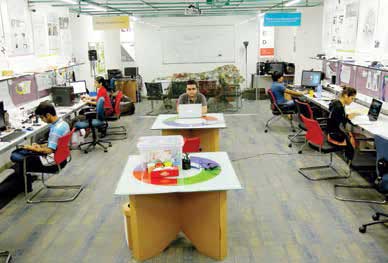
The CII-AICTE National award for the ‘Best Management Institute for Industry Institute Linkage,’ 2015, was awarded to WeSchool. We also received the ‘Best Innovative Institute’ Award at the ASSOCHAM’s 9th Higher Education Summit, National Excellence Awards at the hands of Union HRD Minister of State, Prof. Dr. Ram Shankar Katheria, this year. Among the recently published rankings by Business Magazines, Business India, in its National B-School survey, 2015, ranked WeSchool as 11th among B-schools from all over India and 6th in the Private B-schools category. More recently, out of the 500 B-schools, we have usually been coming in the top 15 or 20. These lists include IIMs as well. Region wise, we usually come in the top ten. Outlook Money recently came out with their inaugural report on the best finance B-schools named ‘Best MBA Finance Rankings 2016’. WeSchool was ranked ‘No. 1’ for Placements and ‘No.9’ in the top 25 Finance Specialists and 8th amongst the top ten in metro cities. The study was conducted across 300 institutes and universities that offer MBA in Finance.
WeSchool conducts its admissions once a year for its PGDMs. Applications are invited for about 720 seats and we get around 15000 applications. Students should have completed their graduation with 50 percent marks and have taken the CAT/CMET/XMAT/MAH-CET to be eligible for the selection process. WeSchool calls shortlisted students for a Personal Interview, and Group Activity as part of the selection process. WeSchool also has a Psychometric Test and awards marks for work experience and academic performance as part of the overall evaluation. The emphasis is to evaluate students holistically and select them on basis of merit.
We have matched our steps with the dynamics of the fast paced world of business, not only to configure programs that meet the talent requirements of the industry but also to make sure that we create future thought leaders who are well versed with the implications of their moves
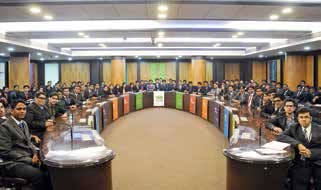
WeSchool has been able to attract some of the best talent in the teaching fraternity. We have 91 core faculty with 133 visiting and 98 guest faculty. Most of the professors have rich and distinguished experience in their respective areas. Many of them are on advisory boards of well-known industrial bodies at national and international levels. They are also invited to lecture students at institutes of repute, both nationally and internationally. We are always looking for talented faculty considering our increasing scope of domain expertise and research interests
The WeSchool culture is an ecosystem that encourages and inspires innovation, design thinking and an outcome oriented mindset with a collaborative approach. WeSchool values diversity and bringing in a multi-stakeholder perspective to all its initiatives. Enriched with persons of academic and industry experience, students from various parts of the country and the globe, a balanced gender ratio, WeSchool is a cauldron of experiments and new ways.
WeSchool culture encourages shunning the arrogant approach of management thinking that relies on the ‘self’ to solve problems and adopt the ‘we’ culture, where we openly embrace newer sources of learning, people from various walks and strata of society, and willingly learn and unlearn.
The underlying fabric is to develop the Self, Organization and Society as an integral unit and hence the work culture encourages practices that delve in-depth and makes sustainable and systemic transformation a reality. ‘We’ is the new ‘I’.
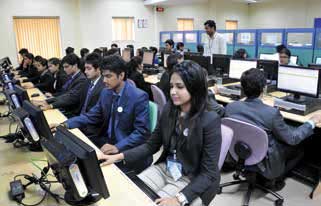
We value international exposure and there are initiatives which streamline this. We have around 18 global collaborations with countries like France, Sweden, Germany and Denmark. A significant part of these include exchange of students, faculty and joint research among other clauses. Working on different projects and assignments, also at times results in their stints at universities abroad, like working on the Indo Sweden Innovation Accelerator initiative in the space of renewables. Experts from Sweden Energy Agency and Malardalen University were so impressed by the thoughts of the team that they invited the team over to Sweden to study the space further. Another similar instance, I recall ,is when we were hosting ICSID (International Council of Society of Industrial Designers) in a multinational team…working on the challenges of any growing metro with the theme–Humanizing a Metropolis. Two of our students were invited over to the Carleton University to further explore how design can impact our everyday lives more emphatically. WeSchool students and faculty also benefit from the Linnaeus Palme Scholarship with Malardalen University (MDH), Sweden, which allows the exchange of students and faculty from WeSchool and MDH. WeSchool has also been offering ‘Destination India’ for a few years now, wherein the focus is to showcase India—its corporate world, society and culture. Students ranging from MBAs to doctoral and post-doctoral levels from leading universities such as Euromed, France and Shanghai, Pepperdine University, USA, Temple University, USA and several others have taken up this program.
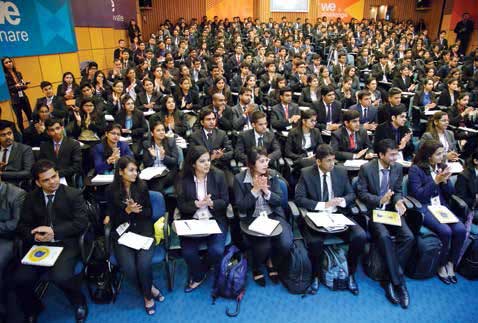
We have a presence in terms of academic collaborations across the globe with countries such as Sweden, Australia, New Zealand, Canada, Denmark, UK, Canada, France, Germany and Israel. This translates into student faculty exchange, joint projects and research and other opportunities of working together. We have collaborations with leading institutions such as the Centre for Creative Leadership (CCL), Harvard Business School, Stanford D School, IDEO, Rotman School. WeSchool offers an extensive global exposure to its students through its rich international partnerships with world class universities viz. Copenhagen Business School (Denmark), Malardalen University and Jonkoping International Business School (Sweden), Otto Friedrich Universitat, Audencia Nantes and IESEG School of Management (France), among others. The most recent was with three hi-tech Israeli universities namely Tel-Aviv University, Ben-Gurion University of Negev, and IDC Herzliya. Most, rather, all the collaborations bring along mutual academic exchange of students and faculty, joint research, training, academic programs and projects. WeSchool partnered with Malardalen University, Sweden to offer the India Sweden Innovation Accelerator (ISIA) program, a platform for Swedish companies to work with academia, to develop business strategies relevant to Indian markets, where our students went to Sweden.
Competition is always good. WeSchool, has over the years, almost always, taken the untrodden path and created new spaces and only enlarged the pie rather than focussing on getting a bigger share of the existing pie. A case in point: we are proud of the ‘Design’ thinking approach we inculcated at WeSchool way back in 2007 when the concept was relatively new even globally, for many. Today, Harvard is talking about the need to integrate design thinking and immersive learning as part of its pedagogical approach. We believe in collaboration and competitiveness rather than focusing on competition. If we make meaningful change in the lives of our students, industry and society, we will remain relevant, irrespective of what others do.
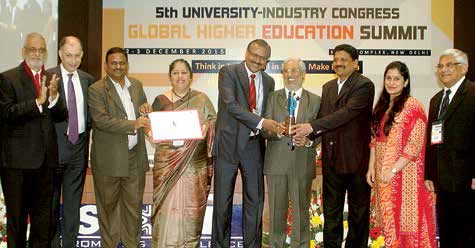
We see internships as snapshots of real life. Most of the times, rather invariably, students work on live challenges drawn from the corporate, government and NGOs...and now also startups. Over the last five years, WeSchool, has been offering the Global Citizen Leader Program - The Global Citizen Leader, a six-month module on leadership that forms an integral part of all PGDM programs. This runs in collaboration with the Centre for Creative Leadership (CCL), USA. CCL trains Fortune 500 companies globally on developing leadership. So far, over 440 students have worked on live challenges drawn from the corporate and government. They study the space closely, meet the stakeholders and craft feasible and sustainable solutions. In the process they are mentored by experts from the industry and faculty, along with interventions from leadership experts. The program involves working on live challenges in the various domains that WeSchool provides, such as Retail, Rural management, Healthcare management, E-business and in the functional spaces such as marketing, finance, human resources and operations, offered by the two-year full-time management program. The Global Citizen Leader program enables students to become mini-entrepreneurs and CEOs of the challenge they work on, providing an exposure out of the boardroom, and bringing indirect engagement and work in the market. The Global Citizen Leader has to remain focused on the Triple Bottom Line, by not just planning optimum utilization of resources, but also by being conscious of the fact that he will be able to achieve self-team-organizational goals only by collaborating with the multi-ethnic teams of stakeholders located in different geo-political-cultural arenas across the globe. Some of the corporates they have worked with are McDonald’s, Tata Motors, Mahindra Finance, Shopoholix, Godrej Innovations, Raymond’s, TRRAIN, Maxwell and Hinduja Hospitals apart from startups and government departments.
In ELCITA (Electronic City Industry and Transport Authority), Bengaluru, they worked on the traffic front, which is a huge issue in that ecosystem. A few of their recommendations were picked up by the authorities concerned. Internships draw out the best in them. It gives them an insight on how things work.
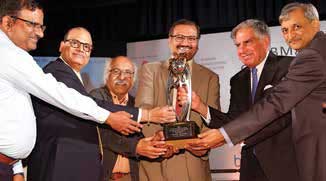
Gone are the days when academia had an exclusively theoretical approach. It has become more experiential now, and another transformational change is that now profits share centre stage with the planet and the people. The social relevance of one’s actions is equally crucial. Business has to be well aligned with national aspirations. Adhering to the same thought process, our students and faculty have been working on various social and civic issues like cleanliness, sanitation, soil health, crime detection, water scarcity, immunization, child mortality, supply chain for farm produce to help farmers and so on. We believe the right education will usher in the needed change. It will first impact the self, then the organization and ultimately the society at large. WeSchool has been consistently involved in several important initiatives such as the fare fixation committee of the Mumbai Metropolitan Development Authority (MMRDA), to come up with an acceptable solution for daily commuters of the Mumbai Metro, and with the Municipal Corporation of Greater Mumbai (MCGM ) for conducting the cleanliness audit of ‘G’ ward, the findings of which were submitted to the MCGM for implementing /improving the levels of cleanliness in other wards. The most recent survey was in collaboration with the National Academy of Customs, Excise & Narcotics (NACEN)-Mumbai and Mumbai Airport Customs, to conduct a survey of ‘passenger satisfaction’ levels of the Customs clearance process at the Chhatrapati Shivaji International Airport (CSIA) in Mumbai.
We are working towards inclusive growth through the talent that we groom.Academic excellence is a given. We want to be known as the doers. When our students move into roles where they make a difference to the society and light up lives, we feel happy. That is the manifestation of our excellence. It is already happening. We want the trend to grow further
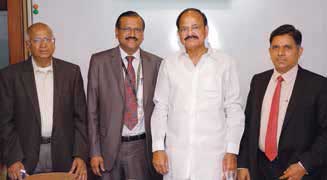
We aim to nurture thought leaders and practitioners who are inspired souls when it comes to taking on challenges anywhere across the globe. They will be ingenious, innovative and conscientious, contributing significantly, not only to the corporate but to the society and nation. Thus we are working towards inclusive growth through the talent that we groom. Academic excellence is a given. We want to be known as the doers. When our students move into roles where they make a difference to the society and light up lives, we feel happy. That is the manifestation of our excellence. It is already happening. We want the trend to grow further. We have been working on initiatives that are well in sync with national aspirations. It feels good to see ourselves fueling the engines of growth and development. Recently, one of our alumni had his start-up on the programming hub, selected by Google. It would be mentored and financed by Google. It was one of six start-ups out of India. Currently, he is working on the same at London. It is our mission to nurture corporate excellence through well trained managerial talent along with being a supporting platform for start-ups and aspiring entrepreneurs. We wish more and more successful ventures roll out of our campuses, more of social innovations come from our fraternity. Our students are already working on some of the grappling issues of the times and are at various stages of completion.
Yes, it has changed in its orientation. It has become more practical and socially relevant. Modern education should play an active role in solving social challenges and nation building. It sounds too academic, but a number of good social breakthroughs and innovations have been coming out of management institutes. With the fast paced technological advances, a new world of opportunities and consequently emerging disciplines have unfolded. This includes e-commerce, data analytics and more. Even traditional areas have to be seen in the perspective of the new ecosystem where technology plays a crucial enabler. Another new trend is of collaborations. And it is logical too…why to reinvent the wheel? Why not pool in our resources and gain out of each other’s strengths? It is good to have the best of the brains working together on issues which need attention on a war footing. Also, there is a huge premium on entrepreneurial ventures which was not the trend few years ago.
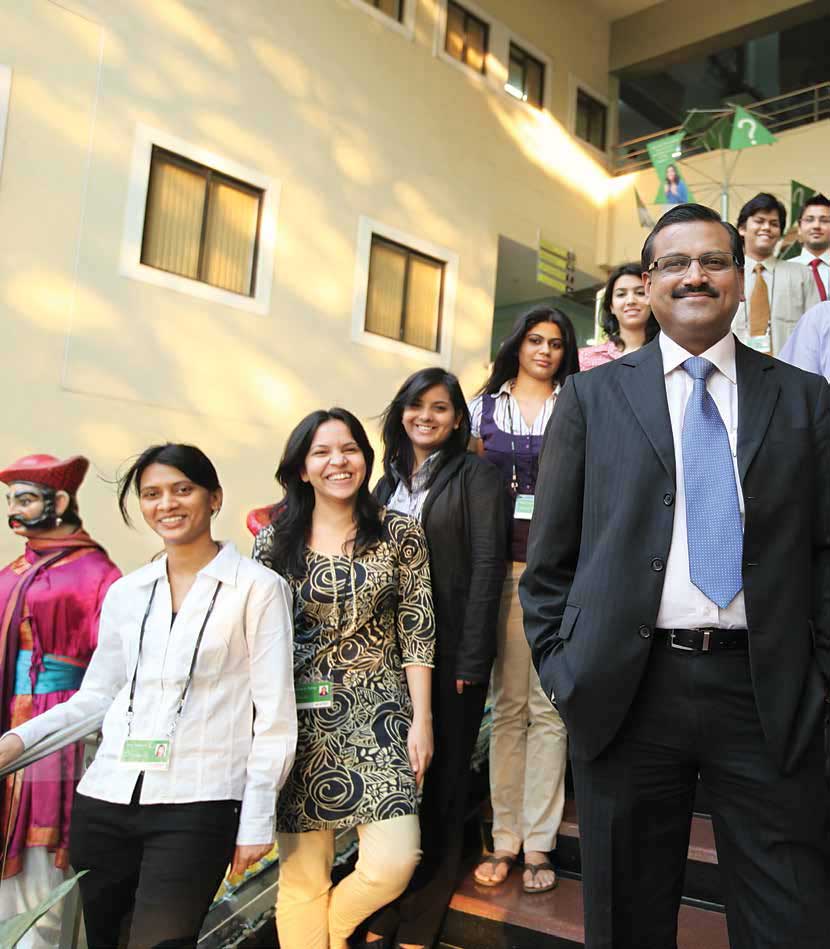
After acquiring a degree in a mechanical engineering with a management degree in ‘Operations’ and a doctorate in ‘Turnaround Strategies’, I naturally opted for a corporate career. My 17 years of experience in academia coupled with industry experience of over 11 years has helped steer WeSchool to great heights by pioneering unique academic programs, partnerships with universities and organizations across the globe. My areas of interest lay in developing community leadership and bringing about social change using academic leadership, social innovation and entrepreneurship through public and private partnerships. After joining WeSchool as a faculty in 1995, I started benchmarking it with the best of the institutes in management education across the country including IIMs, and soon after I started looking at ASEAN countries, Europe and finally USA. Finally, when I found an opportunity to go to Harvard as a visiting fellow in the doctoral program, I spent time in Wharton, NY Stern and other such institutes. I started wondering if I could create a business school like these in India. I engaged myself in a program on ‘Teacher as a Leader and Leader as a Teacher’, by Prof. Harry Davidson at the University of Chicago. That was the turning point for me. It taught me that if a teacher has to be a leader then he has to play multiple roles. He cannot be just a teacher, he needs to be different when he is with colleagues and he has to be different on campus with alumni. It is so important to be able to play these different roles. In March 2000, when I took over as Director of Welingkar, the blueprint of the expansion plan was always there in my mind, thanks to these global exposures. I was very clear that instead of waiting for Welingkar to create a future for me, I must create a future for Welingkar.
Education can play a significant role in designing the future of our society and nation. Be the change you want to be. Hard work, discipline, work ethics and focus are the wonder elements that pave the road that leads to success. Failures should not deter your ambition. I strongly believe that an interdisciplinary approach is far more effective as it brings the best of minds to the table. Follow your instincts, but have discretion, and a fair judgment of your potential, which in turn would help you turn your dreams to reality.
By Mahalakshmi Hariharan